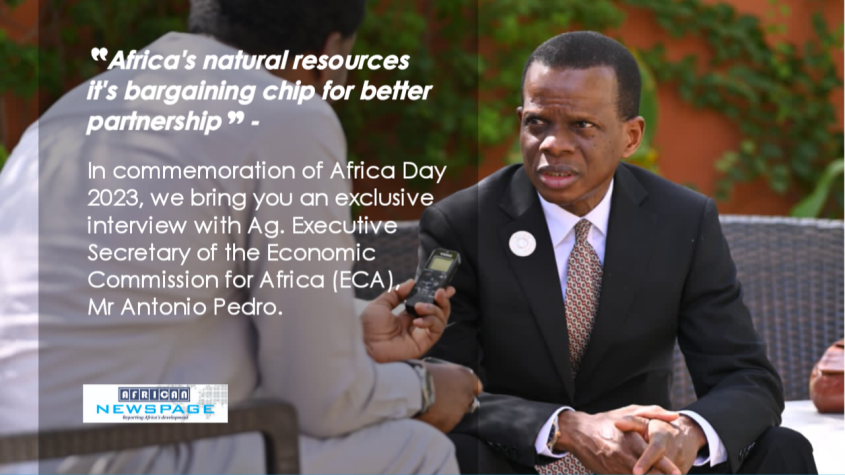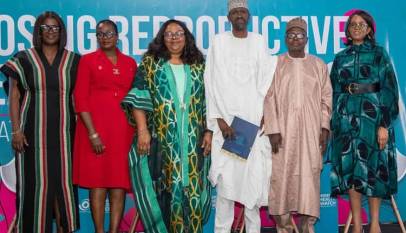FREEMIUM | Africa’s natural resources its bargaining chip for better partnerships – ECA Chief
In commemoration of Africa Day 2023, we bring you an exclusive interview with acting executive secretary of the Economic Commission for Africa (ECA), on ECA’s crucial role in Africa’s effort to boost intra-African trade, achieve industrialization and economic transformation.
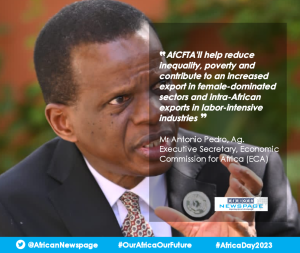
Newspage: The African Union theme for 2023 is accelerating the AfCFTA’s implementation. What is the link between AfCFTA implementation and achieving sustainable industrialization?
Pedro: Accelerating the implementation of the AfCFTA will help Africa harness the wide-ranging opportunities that the Agreement could deliver. And the sooner we implement the AfCFTA, the faster the AfCFTA dividend will reflect in our national and continental GDPs, employment rates and general wellbeing of the people. The promises of the AfCFTA can only be achieved if the Agreement is implemented by its state parties. Let me highlight some of the benefits of the AfCFTA’s implementation.
A single African market will help African countries attain higher economies of scale in manufacturing, leading to increased intra-African trade and bringing supply chains closer home as well as injecting a degree of self-sufficiency in essential commodities such as medicines, foods and fertilizers. By providing more opportunities for women and youth, the AfCFTA will help reduce inequality, poverty and improve inclusion. Moreover, it is expected that the Agreement will contribute to an increased export in female-dominated sectors and intra-African exports in labor-intensive industries.
With regards to industrialization, the AfCFTA will significantly boost the share of manufactured goods in intra-Africa trade; intra-African trade will also exceed Africa’s exports to the rest of the world. In view of the recent multiple shocks, an accelerated and effective implementation of the AfCFTA can help Africa build sufficient shock absorbers against potential shocks in the future. No doubt, the successful implementation of the AfCFTA will help Africa develop solutions against the global challenges of supply chain disruptions, food insecurity, climate change and migration.
Newspage: In this direction, what will you say are the crucial steps necessary to accelerate the implementation of the AfCFTA?
Pedro: First, accelerating the implementation of the AfCFTA requires the ratification of the Agreement by all AU Member States and then implementation of the ratified Agreement by Member States to allow preferential trade to occur. On ratification: the AfCFTA Agreement has been signed by 54 of the 55 AU Member States while 46 of the 54 signatories have deposited their instruments of ratification, as at May 2023. This means only one Member State (Eritrea) is yet to sign the Agreement while 8 signatories have yet to ratify it.
Beyond ratification, the implementation of the AfCFTA is a monumental task. This requires translating the provisions of the Agreement into national laws of State Parties which means State Parties have to speed up the adoption of the Agreement through national legislative measures to give effect to AfCFTA instruments internally, including updating their tariff books, customs processes, certificates of origin etc. As the AfCFTA Guided Trade Initiative (GTI) has demonstrated, these are foundational actions that State Parties must take for preferential trade to take place under the terms of the AfCFTA.
The new AfCFTA protocols on competition policy, intellectual property rights and investment which were negotiated over the past couple of years should be adopted by the AU and then ratified and implemented by Member States with a sense of urgency. These three new protocols will effectively provide the required impetus to make the AfCFTA deliver on its promises of transformation and job creation. The ongoing work on the protocols on women and youth in trade and that on digital trade also needs to be urgently concluded and presented for adoption by the AU Assembly.
Having said this, I would like to note that the progress made with the AfCFTA represents an extraordinary feat of diplomacy and statesmanship which deserves commendation and provides good reasons for optimism. ECA is always ready to support AU Member States in successfully implementing the AfCFTA. The Commission therefore continues to assist in designing national implementation strategies that reflect each country’s unique characteristics and circumstances. We will also support efforts to expedite the signing and ratification of the AfCFTA instruments by our Member States.
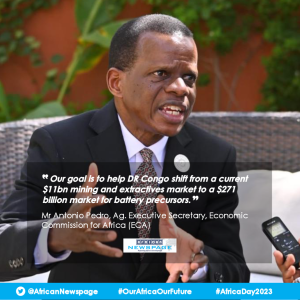
Newspage: The ECA was a key organizing partner for the AU Summit on Industrialization and Economic Diversification held in November 2022 in Niamey, Niger. What did you seek to achieve at the summit?
Pedro: Africa’s structural transformation is our priority, and over the years, we have invested in research to identify what this transformation looks like and how we can work with our member states to achieve it. Our annual Economic Report on Africa (ERA) addresses these issues by outlining the macroeconomic framework that countries can leverage to make the necessary changes for economic transformation. The ERA also identifies sectors with the potential to drive and accelerate economic transformation.
Let me give you some examples: In 2013, our ERA report focused on leveraging Africa’s abundant commodities to drive structural transformation, economic diversification, and industrialization. In 2015, we shifted our focus to achieving industrialization through trade. We have also been involved in the African Continental Free Trade Area (AfCFTA) and helped to create national implementation strategies across different countries, in collaboration with the AU Commission and other AU organs.
Despite our efforts to drive the structural transformation agenda in Africa, our economies are still heavily reliant on exporting raw materials. This makes us vulnerable to various shocks, as we saw during the Covid-19 pandemic, when the global supply routes were closed and we bore the brunt of it. The recent Russia-Ukraine war once again exposed our vulnerability, but our analysis has shown we can change the paradigm. Despite these challenges, we remain committed to finding solutions that will promote economic diversification and advance our structural transformation agenda.
For instance, in response to the pandemic, we supported the creation of the African Vaccine Acquisition Trust (AVAT), a centralized way to purchase vaccines. We were also actively involved in scaling up the production of vaccines in Africa. Furthermore, we helped establish the Africa Trade Exchange (ATEX), an online marketplace for procuring food and fertilizers in larger quantities. We strongly believe that we can make a positive impact on Africa’s future; that’s why we partnered with others to host the summit. Together, we can drive change and make a difference.
Our continental transformation agenda also guided us in taking the lead in establishing the DRC-Africa Business Forum, alongside other organizations such as Afreximbank, the African Development Bank (AfDB), and the Africa Finance Corporation (AFC). This is an important Forum for identifying and concretizing investments that can lead to real change in the country. In this regard, we are partnering with the DRC government to support the country in transitioning to a more profitable market for battery components and chemicals.
Our goal is to help the country shift from a current $11bn mining and extractives market to a $271 billion market for battery precursors. This presents an enormous opportunity for the DRC to transform its economy and create new job prospects for its youth population. Recent evidence indicates the country could enter the $500 billion battery production market as well as the more lucrative electric vehicle value chain, which will be worth $7.7trn and $46trn by 2025 and 2050, respectively. This would be a game-changer.
We also conducted a study on the AfCFTA and its impact on transportation and service infrastructure. Our findings indicate that approximately 2 million trucks will be required to fully leverage the potential of the Agreement. As indicated above, we are, therefore, already envisioning the production of electric vehicles on the continent. This is, of course, on the strength of the explosion of electric vehicles. So, the industrialization summit was part of the conversation on moving from talking about Africa’s potential to turning these ideas into reality.
Newspage: How optimistic are you about the role of DRC-Africa Business Forum in transforming Congo, considering its huge reserve of valuable mineral resources and yet its current state of underdevelopment?
Pedro: I’m very optimistic. During the Forum, we agreed on the need to create the infrastructure for a proposed center of excellence in battery production and support the centre with research and development capabilities. This would help create Africa’s presence across this crucial value chain. Likewise, we will soon be working on a prefeasibility study for the establishment of a trans-boundary special economic zone (SEZ) between the DRC and Zambia for the location of the battery and electric vehicle cluster.
Interestingly, the SEZ will also contemplate investments for the deployment of renewable energy on the continent, including the production of solar panels. This will be premised on the concept that informed the organization of the DRC-Africa Business Forum held in November 2021 and the outcomes of the Forum. To ensure coordination of this effort, we agreed on the establishment of a battery council for both the DRC and Zambia.
Furthermore, the partner institutions are willing to fund the de-risking of investment in the DRC and Zambia, the building of SEZs, and investments supporting infrastructure development, among other things necessary to attract more investors to the region and facilitate exports. We are very happy that some of the Development Finance Institutions (DFIs) are already de-risking investments on the continent; the AFC in particular has invested a lot in building SEZs across the continent, of special note being the Nkok SEZ in Libreville, Gabon.
It’s worth noting that some African business leaders and captains of industry, like Aliko Dangote, who is a bigtime cement manufacturer, are investing in other sectors of the extractive sector, including establishing the Africa’s largest refinery and a fertilizer plant. This is helping us to move from this “paradox of plenty” to utilizing our resources for our industrialization and development.
However, we need more of our business magnates to invest in resource-driven industrialization, including in the DRC, as a demonstration of how we are creating an enabling environment and balancing Foreign Direct Investment (FDI) and Domestic Direct Investment (DDI).
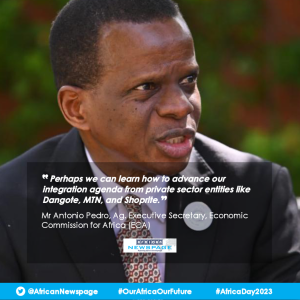
Newspage: We are currently in the 3rd phase of the UN Industrial Development Decade for Africa (IDDA3). What is your view of the idea that Africa’s industrialization is long overdue?
Pedro: While it is long overdue, it is not due to a lack of vision or strategies. The reasons vary. Sometimes we have brilliantly designed visions and strategies, but we lack the supporting legal and regulatory frameworks or institutions to implement them. At other times, we have the vision and the institutions but not the capacity and so on. Basically, implementation has been our problem.
Historically, some of the very forward-looking visions and strategies such as the Lagos Plan of Action (LPA) for the economic development of Africa could not be implemented because of the prevailing development paradigm. As you would recall, the LPA coincided with the Washington Consensus. As such, the pursuit of industrial policies which were at the centre of the LPA hit a wall. Governments found it very difficult to find the necessary policy and I would add fiscal space to implement the LPA when asked to pursue a more neo-liberal approach to development, where only privatization was deemed to be the solution to the constraints of Africa’s development.
We then moved to a period termed “developmental states” and the “Africa Rising” narrative, which was to some extent predicated upon a commodity boom. We had a super cycle, driven essentially by the emergence of China as a major economic power, among other global dynamics that fueled a lot of development. At this time, Africa’s prevailing model was Resource-for-Infrastructure (RFI) deals, whereby, in return for access to its resources, the continent obtained funding for its infrastructure development.
While this was an important step in addressing our infrastructure deficits, it did not put resource-based industrialization at the center of our development agenda. We didn’t invest sufficiently in developing the necessary skills (hard and soft) to enable us to leverage our endowments for our development. There are some exceptions, such as Morocco, which has used its phosphate resources to position itself strategically in the phosphate resource value chain.
As indicated earlier, Covid-19 has exposed how Africa’s overall excessive dependance on the export of raw materials makes the continent vulnerable to commodity price fluctuations and disruptions of trade flows. At the same time, it underscored the importance of pursuing an inward-looking and endogenous growth trajectory, offering an opportunity for African business leaders to retain and invest resources on the continent.
The full implementation of the AfCFTA would strengthen the business fundamentals of such a shift in investment strategy. In other words, the AfCFTA will strengthen the factors that contribute to business growth on the continent. I am confident we can achieve an inclusive and industrialized Africa, with expanded levels of intra-Africa trade and product complementarity between our countries and strong regional value chains, where everyone has the opportunity to improve their standard of living.
These are the factors that led ECA and its partners to commission the Bloomberg study, which demonstrated that the DRC was a cost-competitive investment destination for the production of battery precursors. In addition, its emissions profile is superior to that of other jurisdictions like China, the US and Poland. What we are supporting in the DRC points to the need for more rigorous assessments of our national value propositions and growth diagnostic studies to find areas in our countries with the greatest potential for accelerated structural transformation and economic diversification.
We also hold the view that Science, Technology and Innovation (STI) should be the foundation of our industrial policy and should be integrated into all other policies. We should be mindful that the implementation of industrial policy is not just the business of the ministry of industry alone but rather the business of many sectoral ministries and departments, requiring therefore a whole of government approach and improvements in institutional coordination and cohesiveness.
Newspage: In your speech at the AU Extraordinary Summit on Sustainable Industrialisation and Economic Diversification, you argued that achieving Agenda 2063 “requires leadership, common action, and geo-strategic engagement that is focused and well targeted, in which we use our bargaining power effectively.” What exactly do you mean by this statement?
Pedro: It means we don’t need to beg anymore to develop. Rather, it requires us to understand our endowments and their value. To understand our endowments, we must remember that, for example, Europe requires resources from Africa such as cobalt and lithium to implement its “Green Deal”. We have 60% of the planet’s solar radiation potential, which is necessary for achieving net-zero targets at the global level.
We have more than 70% of the world’s cobalt and huge reserves of other battery minerals such as manganese and other essential minerals for the electrification of transportation systems and the deployment of renewable energy. These assets should be used as bargaining chips when discussing partnerships. However, the value of our endowments is not properly reflected in the grand scheme of things. For instance, even though we control the production of these commodities, we are mostly price takers.
Why are we price takers? Why can’t we be the ones who set the prices? Why can’t we leverage geopolitics to strategically influence commodity prices? We see a lot of perverse situations in which the price of commodities does not reflect supply and demand dynamics but rather is part of a much more complex paradigm, including what we call financialization of commodity markets. In any case, the price of commodities does not take into account the full environmental and social costs of their production. This, however, is a conversation for another day.
We should foster shared value creation and negotiate better terms for our resource sector by ensuring the more lucrative segments of industry with higher shares of value addition and production of manufactured goods are localized on the continent. This is what we are trying to do in the DRC and Zambia, enabling these countries to move from the production and export of raw battery minerals towards the production of battery precursors or even the production of batteries and electric vehicles.
Newspage: Africa’s private sector leaders were often absent from AU summits, including the one on industrialization. What is your commitment to ensuring increased participation of African captains of industry in such summits for greater synergy between the public and private sectors?
Pedro: Every year, ECA organizes the African Business Forum (ABF) on the margins of the ordinary session of the AU Assembly, to promote continued dialogue between the African private and public sectors on matters of strategic importance to the continent. The DRC-ABF was an outcome of one of those ABF sessions. There is a lot of value in creating these kinds of spaces; hence, we need to do more.
Unfortunately, in many jurisdictions on the continent we are more obsessed with creating an enabling environment for FDI than in investing the same energy and effort in creating an enabling environment for DDI. This needs to change. We need to invest more in improving the quality of dialogue between African private sector and their respective governments. Opportunities should be created for institutions such as the chambers of commerce and industry, business councils and others, to play a much greater role in the formulation of government policies and strategies.
Similarly, we must invest more in understanding the needs and interests of local actors on the continent. For instance, most perceptions about investing on the continent are based on surveys or data collected by actors outside the continent. It would be essential to balance that with the engagement of local actors through business enterprise surveys, so as to help us understand the binding constraints to operating in Africa from both an external and internal perspective and thus generate better and smarter industrial policies.
The private sector is key to our development agenda because some argue that Africa’s integration has happened more quickly through the private sector than through government interventions. Perhaps we can learn how to advance our integration agenda from private sector entities like Dangote, MTN, and Shoprite. Therefore, we need a more detailed analysis of our private sector, including the informal sector, which means we need to have these analyses at different levels, particularly the continental, regional, national, and local levels, to profile and better understand our operating space.
Editor’s note: This interview has been edited for length and clarity.

